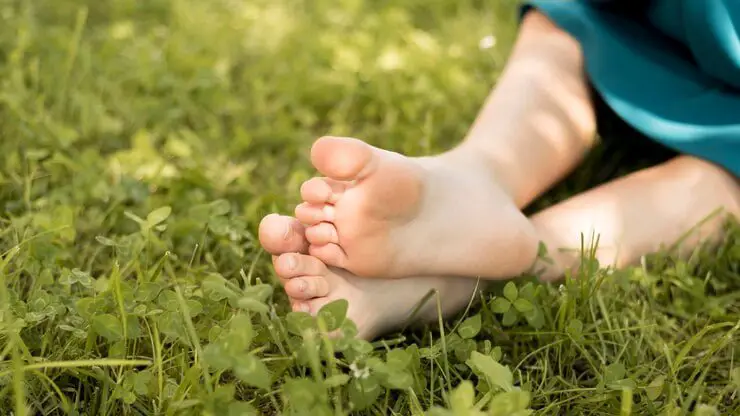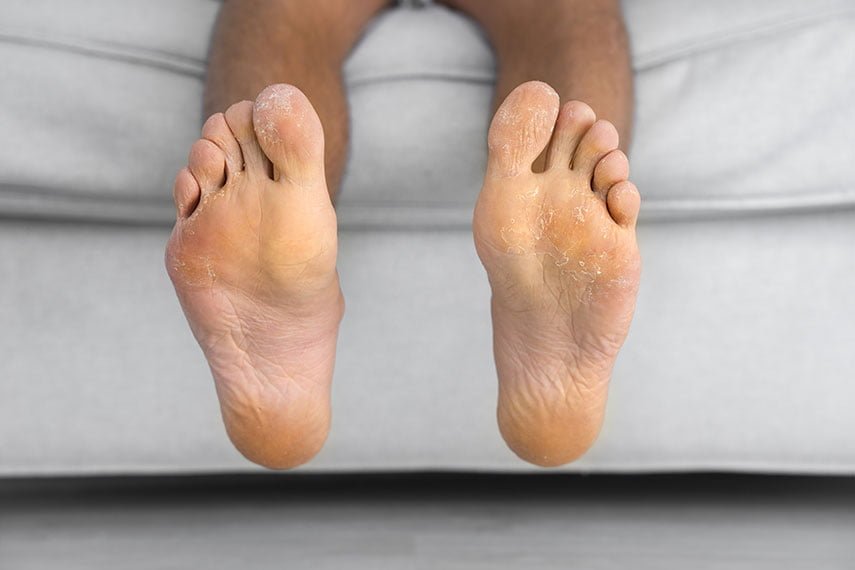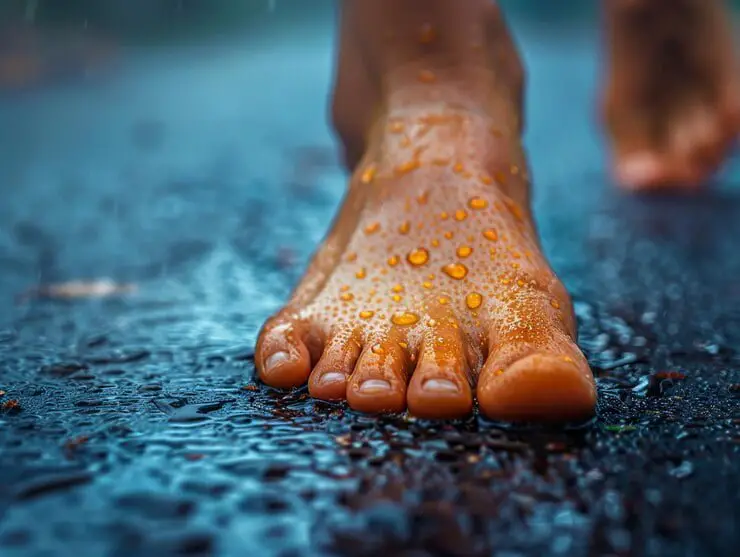Table of Contents
Excessive Foot Sweating Causes and Effective Solutions

Introduction
Excessive sweating of the feet, medically known as plantar hyper hidrosis, is a condition that can be physically uncomfortable and emotionally distressing. This involves overproduction of sweat by the sweat glands in the feet, which can lead to problems such as foot odor, fungal infections and general discomfort. This comprehensive article sheds light on the causes of excessive foot sweat, its effects, and various ways to effectively manage and reduce the condition.
Understanding Excessive Foot Sweating
Excessive sweating in the feet is caused by over activity of the sweat glands in the feet, which results in the body sweating more than it needs to regulate temperature. This condition not only causes physical discomfort but can also affect social interaction and self-esteem.
Reasons for excessive sweating of feet
1. Genetic Factors
Genetics significantly affect sweat gland activity. Research shows that hyperhidrosis often runs in families, suggesting a hereditary component. If close relatives experience similar problems, chances are you will too.
2. Hormonal Changes
Hormonal imbalances or fluctuations can cause excessive sweating. For example, during puberty, menopause, or pregnancy, hormonal changes can increase sweat gland activity. Conditions such as hyperthyroidism can also cause excessive sweating.
3. Medical Conditions
Many underlying medical conditions are associated with excessive sweating of the feet:
- Diabetes: This chronic condition can affect the function of the nervous system and sweat glands, leading to increased sweating.
- Thyroid disorders: An overactive thyroid (hyperthyroidism) can speed up the metabolism, resulting in excessive sweating.
- Infection: Certain infections can cause fever, which can result in increased sweating.
4. Stress and Anxiety
Emotional factors such as stress, anxiety and panic activate the sympathetic nervous system, which controls sweat production. Conditions that cause stress or anxiety can cause sweating in different parts of the body, including the feet.
5. Shoes and Hygiene
Wearing non-breathable or tight shoes can increase sweating by trapping moisture and heat. Synthetic materials in shoes often do not allow adequate ventilation. Inadequate foot hygiene, such as infrequent washing or drying, can also contribute to the problem.
6. Diet and Lifestyle
Spicy foods, caffeine and alcohol can increase sweating because they stimulate the sweat glands. A sedentary lifestyle can also increase sweating.
Effects of excessive sweating of the feet

foot odor
Sweat, combined with bacteria that thrive in moist environments, can cause unpleasant foot odor. It can affect personal interactions and self-esteem.
Fungal Infection
A moist environment is ideal for fungal growth. Conditions such as athlete’s foot (tinea pedis) are common in people with excessively sweaty feet, causing symptoms such as itching, redness and peeling.
Discomfort and skin problems
Constant moisture can cause skin irritation, rashes and blisters. This pain can make daily activities and wearing certain shoes difficult.
Management and reduction of excessive foot sweating
1. Maintain proper foot hygiene
- Daily Wash: Clean your feet daily with antibacterial soap to remove sweat and bacteria.
- complete drying: Make sure your feet are completely dry before putting on socks and shoes. Use a towel and consider a hair dryer on a cool setting to dry thoroughly.
2. Choose breathable shoes
- Natural Materials: Choose shoes made of natural materials such as leather or breathable fabric to allow for better air circulation.
- Proper Fit: Make sure shoes fit well to avoid excessive friction and overheating.
3. Use moisture wicking socks
- Material Selection: Choose socks made from moisture-wicking materials such as merino wool or special synthetic fibers designed to wick moisture away from the skin.
- Regular Changes: Change socks several times a day if they get damp to keep feet dry.
4. Apply Antiperspirants
- specific Foot Products: Use an antiperspirant designed for feet. Apply them at night so the product can work overnight and reduce sweat production.
- Regular Use: Continuous use is essential for effectiveness.
5. Try foot powders and sprays
- Absorbing powders: Foot powders containing talcum powder or cornstarch can absorb more moisture and reduce odor.
- Antifungal Spray: If you are prone to infections, consider an antifungal spray.
6. Consider Medical Treatment
Prescription Antiperspirants: Stronger antiperspirants available by prescription can provide additional relief.
- Iontophoresis: This treatment involves using a device that passes a mild electrical current through the skin to reduce sweating.
- Botox Injection: Botox can temporarily block the nerves that stimulate the sweat glands and provide relief for several months.
- Surgery: In severe cases, surgical options such as sympathectomy may be considered to cut the nerve responsible for sweating.
7. Stay Hydrated
BALANCED DIET: Adequate water intake can help regulate body temperature and reduce sweat concentration.
8. Lifestyle Adjustment
- Healthy Weight: Maintaining a healthy weight can help control sweating, as excess weight can increase sweat production.
- Stress Management: Techniques such as yoga, meditation, or therapy can help manage stress levels and reduce stress-induced sweating.
Precautions
- Avoid triggers: Identify and avoid foods and drinks that increase sweating, such as caffeine and spicy foods.
- Regular Foot Examination: Monitor your feet for signs of fungal infection or other problems and address them promptly.
Home Remedies for Excessive Foot Sweating: Natural Techniques to Keep Your Feet Dry and Healthy
Excessive foot sweating, or plantar hyper hidrosis, is a condition that affects many people, causing discomfort, embarrassment, and even skin-related issues like infections and odor. While medical treatments are available, many individuals prefer to start with home remedies that are both natural and cost-effective. These remedies can help manage foot moisture, reduce sweat production, and address the problems associated with excessive sweating. Below, we delve deeper into the most effective home remedies for controlling foot sweat, providing detailed explanations and step-by-step instructions for each method.
1. Foot Soaks:
Soothing Treatments to Reduce Sweating and Prevent Infections.Foot soaks are one of the most effective home remedies for managing excessive foot sweating. They not only help to cleanse and refresh the feet but also offer specific benefits such as reducing sweat production, killing odor-causing bacteria, and soothing tired feet. Here are some of the most effective foot soaks for excessive sweating:
Apple Cider Vinegar Soak:
- Why It Works: Apple cider vinegar is a popular remedy for hyper hidrosis due to its astringent properties, which help tighten the skin and temporarily close the sweat glands. Additionally, its natural antibacterial properties help in preventing foot odor and infections caused by excessive moisture.
- How to Use: To prepare an apple cider vinegar foot soak, mix one part apple cider vinegar with two parts warm water in a large basin. Ensure the mixture is deep enough to fully submerge your feet. Soak your feet in the solution for 15 to 20 minutes daily, ideally before bed. After soaking, rinse your feet with clean water and dry them thoroughly, especially between the toes, to prevent moisture buildup.
Epsom Salt Soak:
- Why It Works: Epsom salt, or magnesium sulfate, is well-known for its ability to draw out toxins and excess moisture from the skin. It also has natural soothing properties, making it an excellent remedy for reducing foot discomfort associated with excessive sweating.
- How to Use: Dissolve half a cup of Epsom salt in a basin of warm water. Stir the water until the salt is completely dissolved, then soak your feet for 15 to 20 minutes. For best results, perform this soak a few times a week. After each session, rinse your feet with clean water, dry them thoroughly, and apply a light moisturizer if needed.
Baking Soda Soak:
- Why It Works: Baking soda is alkaline, which helps balance the pH of your skin, making it less hospitable for bacteria and fungi that thrive in moist environments. It also has natural deodorizing properties, which can help neutralize foot odor.
- How to Use: To create a baking soda foot soak, dissolve 2 to 3 tablespoons of baking soda in a basin of warm water. Stir until the baking soda is fully dissolved. Soak your feet for 15 to 20 minutes daily. After soaking, rinse your feet, pat them dry, and apply a moisture-absorbing foot powder if necessary.
2. Natural Antiperspirants:
Using Nature’s Ingredients to Block Sweat Glands
Natural antiperspirants can be an effective way to manage excessive foot sweating without resorting to harsh chemicals. These remedies work by either temporarily blocking the sweat glands or absorbing the moisture produced by your feet. Here’s a detailed look at some of the most effective natural antiperspirants:
Cornstarch or Talcum Powder:
Why It Works: Cornstarch and talcum powder are highly absorbent materials that can help keep your feet dry by soaking up excess moisture. Cornstarch, in particular, is a great natural option because it’s gentle on the skin and can be used frequently without irritation.
How to Use: After washing and thoroughly drying your feet, sprinkle a generous amount of cornstarch or talcum powder over your feet, focusing on areas prone to sweating, such as between the toes. Reapply the powder throughout the day as needed, especially before putting on socks and shoes.
Tea Tree Oil:
- Why It Works: Tea tree oil has powerful astringent and antimicrobial properties, which help reduce sweating and prevent the growth of bacteria that cause foot odor. It’s also effective against fungi, making it a good option for preventing athlete’s foot.
- How to Use: Mix a few drops of tea tree oil with a carrier oil, such as coconut or olive oil, to dilute its potency and avoid skin irritation. Massage the mixture onto clean, dry feet, paying special attention to the soles and between the toes. Alternatively, you can add a few drops of tea tree oil to a foot soak for added benefits.
Alum Powder:
- Why It Works: Alum powder is a natural astringent that works by temporarily blocking the sweat glands, reducing the amount of sweat produced. It’s a traditional remedy for hyperhidrosis and can be found in many natural deodorants.
- How to Use: Dissolve 1 to 2 teaspoons of alum powder in a basin of warm water and soak your feet for 15 to 20 minutes. After soaking, rinse your feet with clean water and dry them thoroughly. For a stronger effect, you can also apply a small amount of dry alum powder directly to your feet after bathing.
3. Dietary Adjustments: Eating Your Way to Drier Feet
What you eat and drink can have a direct impact on how much you sweat. Certain foods and beverages can trigger sweating, while others can help reduce it. Making strategic changes to your diet can be an effective way to manage excessive foot sweating naturally.
Stay Hydrated:
- Why It Works: Drinking plenty of water helps regulate your body’s temperature, which can reduce the need for sweating. Staying hydrated also helps flush out toxins that could contribute to excessive sweating.
- How to Use: Aim to drink at least 8 glasses of water a day. If you’re active or live in a hot climate, you may need to drink even more. Incorporating hydrating foods, such as cucumbers, watermelon, and leafy greens, into your diet can also help maintain adequate hydration.
Avoid Spicy Foods:
- Why It Works: Spicy foods can raise your body temperature and stimulate your sweat glands, leading to increased sweating. Capsaicin, the compound that gives chili peppers their heat, triggers nerve receptors in your mouth, which signal your body to cool down by sweating.
- How to Use: If you suffer from excessive foot sweating, consider reducing or eliminating spicy foods from your diet. Monitor your sweat levels to see if cutting out these foods makes a noticeable difference.
Reduce Caffeine and Alcohol:
- Why It Works: Both caffeine and alcohol stimulate your nervous system, which can increase sweat production. Caffeine raises your heart rate and body temperature, leading to sweating, while alcohol dilates blood vessels, making you feel warmer and prompting your body to sweat more.
- How to Use: Limit your intake of caffeinated beverages such as coffee, tea, and energy drinks, as well as alcoholic drinks. Try substituting them with decaffeinated or herbal teas, water, or other non-caffeinated, non-alcoholic options.
4. Proper Footwear and Socks: Choosing the Right Gear for Sweat-Free Feet
The type of shoes and socks you wear can greatly impact the level of moisture and sweating in your feet. By choosing breathable materials and properly maintaining your footwear, you can significantly reduce foot sweat and its associated problems.
Moisture-Wicking Socks:
- Why It Works: Moisture-wicking socks are designed to draw sweat away from your skin, keeping your feet dry. These socks are typically made from materials like merino wool or specialized synthetic blends that offer superior moisture management compared to cotton socks.
- How to Use: Replace all of your regular cotton socks with moisture-wicking alternatives, especially if you’re prone to sweating during exercise or warm weather. Look for socks labeled as “moisture-wicking” or “breathable” and choose those made from natural fibers or high-performance synthetics.
Breathable Shoes:
- Why It Works: Breathable shoes allow air to circulate around your feet, helping to evaporate sweat and keep your feet dry. Shoes made from natural materials like leather or those with mesh panels are ideal for this purpose.
- How to Use: Avoid wearing shoes made of synthetic materials like plastic or rubber, which can trap heat and moisture. Instead, opt for shoes with good ventilation, such as those with mesh uppers or those designed specifically for breathability. If possible, alternate between different pairs of shoes to give each pair time to dry out completely between wears.
Rotate Your Shoes:
- Why It Works: Wearing the same pair of shoes every day doesn’t allow them to dry out completely, leading to moisture buildup and potentially worsening foot sweat and odor.
- How to Use: Rotate between at least two pairs of shoes, allowing each pair at least 24 hours to air out and dry between wears. If possible, remove the insoles and let them air out separately to speed up the drying process.
5. Hygiene and Skincare Practices: Keeping Your Feet Clean and Dry
Good foot hygiene is essential for managing excessive sweating and preventing complications like infections and odor. Regular cleansing, exfoliation, and moisturizing can help keep your feet in top condition.
Daily Foot Washing:
- Why It Works: Washing your feet daily with antibacterial soap helps remove sweat, bacteria, and fungi, reducing the risk of infections and odor. This is especially important for individuals with hyperhidrosis, as moist environments are ideal for bacterial and fungal growth.
- How to Use: Wash your feet with warm water and antibacterial soap every day, paying extra attention to the spaces between your toes where moisture can accumulate. After washing, dry your feet thoroughly, especially between the toes, to prevent moisture from getting trapped. Consider using a hairdryer on a cool setting to ensure your feet are completely dry.
Exfoliation:
- Why It Works: Regular exfoliation removes dead skin cells that can trap moisture and create a breeding ground for bacteria. Exfoliating your feet also helps keep the skin smooth and reduces the risk of calluses and blisters.
- How to Use: Use a foot scrub or pumice stone to exfoliate your feet once or twice a week. Focus on areas that are prone to roughness, such as the heels and the balls of your feet. After exfoliating, rinse your feet with clean water, dry them thoroughly, and apply a moisturizer or foot cream to keep the skin soft.
Foot Powder Application:
- Why It Works: Foot powders are designed to absorb excess moisture and keep your feet dry throughout the day. They often contain ingredients like talcum powder, cornstarch, or baking soda, which help reduce sweating and prevent odor.
- How to Use: After washing and drying your feet, apply a light layer of foot powder before putting on socks. Focus on areas that tend to sweat the most, such as the soles and between the toes. Reapply the powder as necessary throughout the day, especially if you’re wearing closed-toe shoes.
6. Lifestyle Adjustments: Simple Changes for Long-Term Relief
In addition to specific remedies, making certain lifestyle adjustments can help manage excessive foot sweating over the long term. These changes may involve altering your daily routine or adopting new habits that promote dryness and comfort.
Use Antiperspirant at Night:
- Why It Works: Applying antiperspirant to your feet at night allows the active ingredients to absorb into the skin and block sweat glands more effectively. This method gives the antiperspirant time to work overnight, reducing sweating the next day.
- How to Use: Choose a strong antiperspirant, preferably one formulated for excessive sweating or hyper hidrosis. Before bed, apply the antiperspirant to the soles of your feet, focusing on areas that sweat the most. Allow the product to dry completely before putting on socks or going to bed. In the morning, you can wash your feet as usual.
Stay Cool and Dry:
- Why It Works: Keeping your environment cool and dry can reduce your body’s need to sweat. This is especially important during warm weather or in situations where you’re likely to sweat more, such as during physical activity.
- How to Use: Use fans or air conditioning to keep your living space cool, especially during hot or humid weather. Wear lightweight, breathable clothing made from natural fibers like cotton or linen. If you exercise, choose moisture-wicking fabrics that help keep you dry. Consider using cooling sprays or wipes on your feet during the day to refresh and reduce sweating.
Manage Stress:
- Why It Works: Stress and anxiety can trigger or worsen hyper hidrosis, as your body responds to stress by producing more sweat. Managing stress can help reduce overall sweating and improve your quality of life.
- How to Use: Practice stress-reduction techniques such as deep breathing, meditation, or yoga. Regular physical activity and sufficient sleep can also help manage stress levels. If you find that stress is a significant trigger for your sweating, consider seeking support from a therapist or counselor.
Excessive foot sweating can be a challenging condition to manage, but with the right home remedies and lifestyle adjustments, you can significantly reduce sweating and improve your foot health. By incorporating foot soaks, natural antiperspirants, dietary changes, proper footwear, and good hygiene practices, you can address the root causes of hyper hidrosis and enjoy drier, more comfortable feet. While home remedies can be highly effective, it’s important to monitor your condition and consult a healthcare professional if symptoms persist or worsen. With patience, consistency, and a holistic approach, you can find relief and regain confidence in your daily life.
Frequently Asked Questions (FAQ)
1. What causes sweaty feet in summer?
During summer, rising temperatures and humidity levels can increase sweating, including in the feet. Heat causes sweat glands to become more active, and combined with humidity, this creates an environment where sweat doesn’t evaporate as quickly, making sweat more noticeable.
2. Can excessive sweating of the feet be a sign of a serious health problem?
Although excessive sweating of the feet can often be a benign problem, it can sometimes be a sign of underlying health conditions such as diabetes, thyroid disorders, or infections. If you experience sudden or severe changes in sweat patterns, it is recommended to consult a healthcare professional.
3. Are there any home remedies to reduce foot sweat?
Yes, some home remedies include soaking your feet in a solution of vinegar and water, which can help reduce sweating and fight odor. Additionally, using baking soda or cornstarch on your feet can help absorb moisture.
4. How often should I change my socks if my feet sweat a lot?
If the socks get wet, it is advisable to change them several times a day. Regular changes help keep your feet dry and reduce the risk of fungal infections and odor.
5. Does diet affect foot sweat?
Yes, some foods and drinks can increase sweating. Spicy foods, caffeine and alcohol are known to stimulate sweat glands and can worsen sweating. Adjusting your diet can help control excessive sweating.
6. How effective are antiperspirants for feet?
Antiperspirants designed specifically for feet can be very effective in reducing sweating. They work by blocking sweat glands and are most effective when applied before bedtime, allowing the product to work overnight.
7. What should I do if over-the-counter treatments are not effective?
If over-the-counter treatments don’t provide enough relief, consider consulting a healthcare professional. They may recommend stronger prescription treatments or discuss more advanced options such as iontophoresis, Botox injections, or surgical intervention.
Conclusion
Excessive sweating of the feet, while difficult, can be effectively managed with a combination of good hygiene practices, appropriate footwear and targeted treatment. Understanding the underlying causes and implementing practical solutions can significantly reduce discomfort and improve your quality of life. If self-care measures are insufficient, it is important to seek professional advice to explore advanced treatment options and address any potential underlying health issues.

